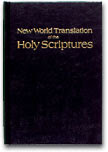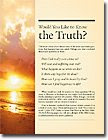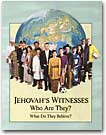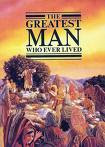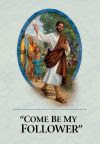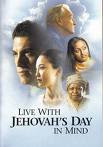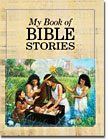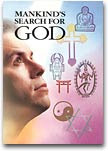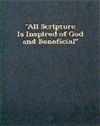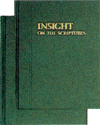With these simple words, Jesus Christ gave something for Trinitarians to cling to--as long as they take the words out of context. First, however, we will look at other verses that give a satisfying explanation to this verse and then use the context to close the matter.
First of all, look at John 17:20-22. "I make request, not concerning these only, but also concerning those putting faith in me through their word; in order that they may all be one, just as you, Father, are in union with me and I am in union with you, that they also may be in union with us, in order that the world may believe that you sent me forth. Also, I have given them the glory that you have given me, in order that they may be one just as we are one."-John
Jesus asked that his Apostles and other disciples be one in the same way that Christ and his Father are one. The idea that these Apostles and disciples make up a Trinity or multiple Trinities is just absurd. So, digging deeper, we need to learn what Christ meant by this.
First of all, turn to 1 Corinthians 1:10. Paul says, "Now I exhort you, brothers, through the name of our Lord Jesus Christ that you should all speak in agreement, and that there should not be divisions among you, but that you may be fitly united in the same mind and in the same line of thought." The brothers in Corinth were plagued with divisions within the congregation. Paul was telling them that they were to be of the same thought and mind. One way in which they were divided is mentioned a little later in the letter.
Paul, attempting to silence people who were putting too much emphasize on him and another Christian, Apollos, continued: "What I mean is this, that each one of you says: 'I belong to Paul,' 'But I to Apollos,' 'But I to Cephas,' 'But I to Christ.'" (1 Corinthians 1:11) He then continues, and finally says, "What, then, is Apollos? Yes, what is Paul?...I planted, Apollos watered, but God kept making it grow; so that neither is he that plants anything nor is he that waters, but God who makes it grow. Now he that plants and he that waters are one, but each person will receive his own reward according to his own labor."-1 Corinthians 3:5-8
Paul and Apollos, and all true Christians, are one in that they have the same interests and desires. That is what 1 Corinthians 1:10 is speaking of. That is what Jesus is speaking of in John 17:20-22. When Jesus said that he wants all of his disciples to be one, we see that Paul explained exactly what the Lord meant. And in the same way that all of the disciples are one, in thought, word, deed, and work, God and Christ are one in that same way.
So, when we read John 10:30 in the future or that objection is raised by a Trinitarian, we can use Biblical reasoning to show what the Bible really teaches.
Now, let us look at the context.
"Therefore the Jews encircled him and began to say to him: 'How long are you to keep our souls in suspense? If you are the Christ, tell us outspokenly.'Jesus answered them: 'I told you, and yet you do not believe. The works that I am doing in the name of my Father, these bear witness about me. But you do not believe, because you are none of my sheep. My sheep listen to my voice, and I know them, and they follow me. And I give them everlasting life, and they will by no means ever be destroyed, and no one will snatch them out of my hand. What my Father has given me is something greater than all other things, and no one can snatch them out of the hand of the Father. I and the Father are one.'"-John 10:24-30
First off, the Jews were not asking if Jesus was God, if he and the Father were one, or if he was part of a Trinity. They simply wanted to know if he was the Messiah. Christ then told them that he had told them the answer to that question and began speaking about his sheep. He says that those Jews are not sheep because they would have listened to him. And then he says that the sheep that he has actually belong to the Father and were given him by the Father. They belong to the Father and the Son and that makes them one.
"Once more the Jews lifted up stones to stone him. Jesus replied to them: 'I displayed to you many fine works from the Father. For which of those works are you stoning me?' The Jews answered him: 'We are stoning you, not for a fine work, but for blasphemy, even because you, although being a man, make yourself a god*.' Jesus answered them: 'Is it not written in your Law, "I said: 'You are gods'"? If he called ‘gods’ those against whom the word of God came, and yet the Scripture cannot be nullified, do you say to me whom the Father sanctified and dispatched into the world, ‘You blaspheme,' because I said, 'I am God’s Son'? If I am not doing the works of my Father, do not believe me. But if I am doing them, even though you do not believe me, believe the works, in order that you may come to know and may continue knowing that the Father is in union with me and I am in union with the Father.' Therefore they tried again to seize him; but he got out of their reach."-John 10:31-39
Christ begins to say that he "making himself a god" was not so far-fetched because the Bible calls humans gods. Jesus then quotes Psalm 82:6, which says in part, "I myself have said, ‘you are gods." He acknowledges that the Bible calls mere humans gods. The Bible also calls angels gods and Satan the devil a god and even calls Moses a god.-see Psalm 8:5 and the quote at Hebrews 2:7; 2 Corinthians 4:4; Exodus 7:1.
From what we have seen, John 10:30 does not prove the Trinity as being correct.
*Many Bible translations say "God" here instead of "a god", but really the next few verses support the rendering "a god" because Christ begins talking about humans as gods and not humans as God. The defense of humans being gods would not be appropriate if he was trying to explain that he was equal to the Father.

